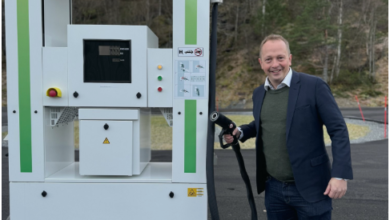BMW i Hydrogen NEXT starts tests on European roads
Hydrogen fuel cell technology has the potential to become an alternative to battery-electric drive trains, especially in the absence of electric charging infrastructure or when long distances required.

The BMW Group is starting to test BMW i Hydrogen NEXT prototypes, near-standard vehicles with a hydrogen fuel cell drive train on European roads.
The prototypes examine various aspects, including drive train, chassis technology and electronics systems, and the field testing will provide practical experience in the use of this sustainable drive technology. The field testing also focused on efficiency, safety, convenience and reliability. The testing programme will help BMW to develop a small-series model on the basis of the BMW X5 in late 2022. The BMW i Hydrogen NEXT is a pure electric vehicle that uses fuel cell technology.
The road tests now underway are fine-tuning the software that controls all driving and operating functions. The fuel cell system, hydrogen tanks, performance buffer battery and central vehicle control unit are already tested on test benches. These tests are now being followed with field testing on the roads in real traffic situations to validate the efficiency, safety, convenience and reliability of all components.
The complete drive system in the BMW i Hydrogen NEXT combines hydrogen fuel cell technology with fifth-generation BMW eDrive technology, which can already be experienced in the BMW iX3 and soon the BMW iX and BMW i4. The fuel cell delivers an electrical output of 125 kW/170 hp, where an electric converter then adjusts the voltage according to the electric motor.
Energy stored in a performance buffer battery is also used for dynamic acceleration manoeuvres and short bursts of speed for overtaking, delivering 275 kW/374 hp. The energy in the buffer battery is generated during driving by recovering energy from coasting overrun and braking phases.
The hydrogen tank of the BMW i Hydrogen NEXT can be filled within 3-4 minutes with a fuel that ensures a range of several hundred kilometres in all weather conditions. The hydrogen needed to supply the fuel cell is stored in two 700-bar tanks made of carbon-fibre reinforced plastic (CFRP), which together hold six kilograms of hydrogen.
The BMW i Hydrogen NEXT uses fuel cells from the product development cooperation with the Toyota Motor Corporation, where the individual fuel cells are sourced from Toyota, while the fuel cell stack and complete drive system are original BMW Group developments. The cooperation was established in 2013 with the aim to optimise and scale hydrogen fuel cell technology.
Frank Weber, a member of the Board of Management of BMW AG responsible for Development, said, “Hydrogen fuel cell technology can be an attractive option for sustainable drive trains – especially in larger vehicle classes.”
